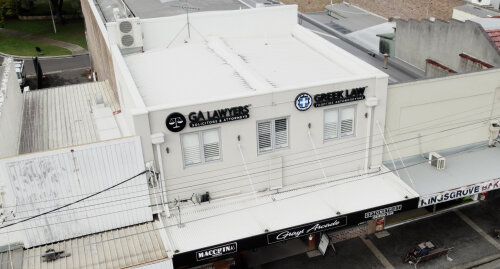Best Toxic Tort Lawyers in Australia
Share your needs with us, get contacted by law firms.
Free. Takes 2 min.
Or refine your search by selecting a city:
List of the best lawyers in Australia
About Toxic Tort Law in Australia
Toxic Tort law in Australia deals with legal claims related to exposure to harmful substances, such as chemicals, pharmaceuticals, or environmental pollutants. This area of law seeks to address harm or injury that individuals, communities, or the environment suffer due to the release or improper handling of toxic substances. Claims are typically brought against manufacturers, distributors, or entities responsible for the toxic exposure. Common cases involve workplace exposure, pharmaceutical drugs, consumer products, and environmental contamination.
Why You May Need a Lawyer
If you suspect or have evidence that you have been exposed to a toxic substance causing harm, you may need a lawyer to navigate the complexities of Toxic Tort claims. Common situations include workplace exposure to hazardous materials, health issues linked to pharmaceutical drugs, exposure to contaminated water, soil, or air, and product liability cases where consumer products have caused harm. A lawyer will help in gathering evidence, representing your interests, and ensuring that your rights are protected through the legal process.
Local Laws Overview
Toxic Tort claims in Australia are influenced by a combination of state and federal legislations. Key aspects include the National Environment Protection Measures (NEPMs) and regulations under the Environmental Protection and Biodiversity Conservation Act 1999. Occupational health and safety laws play a significant role in workplace-related toxic tort cases. Furthermore, product liability cases may be governed by the Australian Consumer Law, which provides remedies for defective goods that cause harm. Statutes of limitation can also vary, so it's crucial to consult with legal professionals promptly.
Frequently Asked Questions
What is a Toxic Tort?
A Toxic Tort is a legal claim for harm caused by exposure to a dangerous substance, such as chemicals, pharmaceuticals, or environmental pollutants.
How do I know if I have a Toxic Tort case?
If you have experienced health issues related to exposure to toxic substances and can link your illness or injury to this exposure, you may have a case. A lawyer can help determine the viability of your claim.
Who can be held liable in a Toxic Tort case?
Potential defendants can include manufacturers, distributors, employers, landowners, and government bodies responsible for regulating or failing to regulate the use of toxic substances.
What kind of compensation can I expect in a Toxic Tort case?
Compensation may include medical expenses, lost wages, pain and suffering, and in some cases, punitive damages. The specifics will depend on the details of your case.
How does a lawyer prove a Toxic Tort case?
A lawyer will gather evidence showing the connection between the exposure and your injuries, which may include medical records, expert testimonies, and proof of exposure to the toxic substance.
Is there a time limit to file a Toxic Tort claim in Australia?
Yes, there are statutes of limitation that vary by state and the specifics of the case. It is essential to consult with a lawyer as soon as possible to ensure your claim is filed timely.
Can multiple people file a Toxic Tort lawsuit together?
Yes, in cases where multiple individuals are harmed by the same source, a group may file a class action lawsuit to collectively pursue their claims.
What role do regulatory bodies play in Toxic Tort cases?
Regulatory bodies can establish safety standards, and their findings or reports may be used as evidence in a case. They may also be defendants if they failed in their regulatory duties.
Do I need to have suffered a physical injury to file a Toxic Tort claim?
Not necessarily. While physical injuries are common in these cases, claims can also be based on emotional distress or projected future health risks caused by exposure.
What steps should I take if I've been exposed to a toxic substance?
Seek medical attention immediately, document your symptoms and exposures, and consult with a lawyer experienced in Toxic Tort law to discuss your legal options.
Additional Resources
Consider the following resources for more information and assistance with Toxic Tort issues:
- The Australian Centre for Environmental Law (ACEL)
- The Environment Protection Authority (EPA) in your state or territory
- Safe Work Australia for workplace exposure queries
- The Australian Human Rights Commission for health rights issues
- Legal aid services in your state or territory for access to legal advice and representation
Next Steps
If you need legal assistance in a Toxic Tort matter, the first step is to consult with a lawyer experienced in this area of law. Gather any documentation related to your exposure and health condition, including medical records, witness statements, and evidence of the toxic substance. Consider seeking support from relevant governmental and non-governmental organizations to gain a broader understanding of your situation. Early legal advice can be crucial in protecting your rights and securing any compensation you may be entitled to.
Lawzana helps you find the best lawyers and law firms in Australia through a curated and pre-screened list of qualified legal professionals. Our platform offers rankings and detailed profiles of attorneys and law firms, allowing you to compare based on practice areas, including Toxic Tort, experience, and client feedback.
Each profile includes a description of the firm's areas of practice, client reviews, team members and partners, year of establishment, spoken languages, office locations, contact information, social media presence, and any published articles or resources. Most firms on our platform speak English and are experienced in both local and international legal matters.
Get a quote from top-rated law firms in Australia — quickly, securely, and without unnecessary hassle.
Disclaimer:
The information provided on this page is for general informational purposes only and does not constitute legal advice. While we strive to ensure the accuracy and relevance of the content, legal information may change over time, and interpretations of the law can vary. You should always consult with a qualified legal professional for advice specific to your situation.
We disclaim all liability for actions taken or not taken based on the content of this page. If you believe any information is incorrect or outdated, please contact us, and we will review and update it where appropriate.
Browse toxic tort law firms by city in Australia
Refine your search by selecting a city.
















